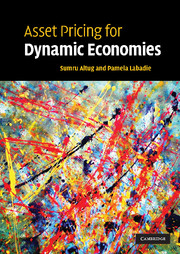Book contents
- Frontmatter
- Contents
- List of figures
- List of tables
- Preface
- I BASIC CONCEPTS
- 1 Complete contingent claims
- 2 Arbitrage and asset valuation
- 3 Expected utility
- 4 CAPM and APT
- 5 Consumption and saving
- II RECURSIVE MODELS
- III MONETARY AND INTERNATIONAL MODELS
- IV MODELS WITH MARKET INCOMPLETENESS
- V SUPPLEMENTARY MATERIAL
- Bibliography
- Index
2 - Arbitrage and asset valuation
Published online by Cambridge University Press: 01 June 2010
- Frontmatter
- Contents
- List of figures
- List of tables
- Preface
- I BASIC CONCEPTS
- 1 Complete contingent claims
- 2 Arbitrage and asset valuation
- 3 Expected utility
- 4 CAPM and APT
- 5 Consumption and saving
- II RECURSIVE MODELS
- III MONETARY AND INTERNATIONAL MODELS
- IV MODELS WITH MARKET INCOMPLETENESS
- V SUPPLEMENTARY MATERIAL
- Bibliography
- Index
Summary
In the theoretical finance literature, the absence of arbitrage opportunities in securities trading has been exploited by Ross [371], Harrison and Kreps [240], Chamberlain and Rothschild [100], and others to show the existence of a pricing function that is used to value random payoff streams and to characterize its properties. We now illustrate their approach for the simple setup that we have been studying.
As part of the material for this chapter, we define notions of arbitrage. We then establish the equivalence between the absence of arbitrage and the existence of a strictly positive state-price vector that can be used to value random payoffs on any security. We show that in a complete markets setting, such a state-price vector will be unique.
We begin our analysis by examining the implications of the absence of arbitrage for investors' portfolios. We define such concepts as the law of one price and arbitrage opportunities of the first and second kind.
ABSENCE OF ARBITRAGE: SOME DEFINITIONS
We assume that there is one date, S states, and one commodity in each state. As a consequence, spot commodity prices can be normalized as unity. As before, we assume that there are S states of the world, and N securities where N ≤ S. Hence, the number of securities may be less than the number of states.
- Type
- Chapter
- Information
- Asset Pricing for Dynamic Economies , pp. 25 - 50Publisher: Cambridge University PressPrint publication year: 2008



